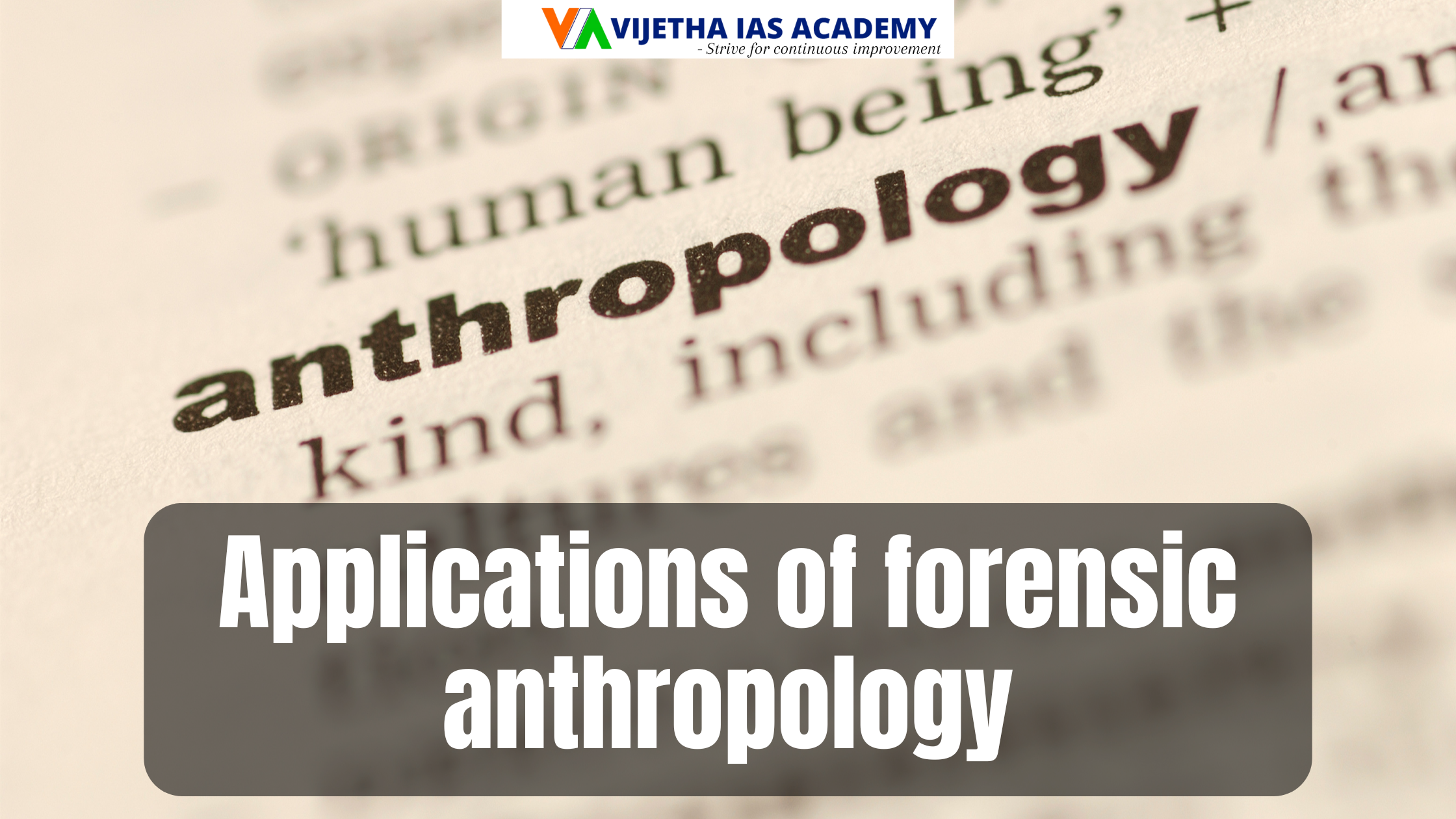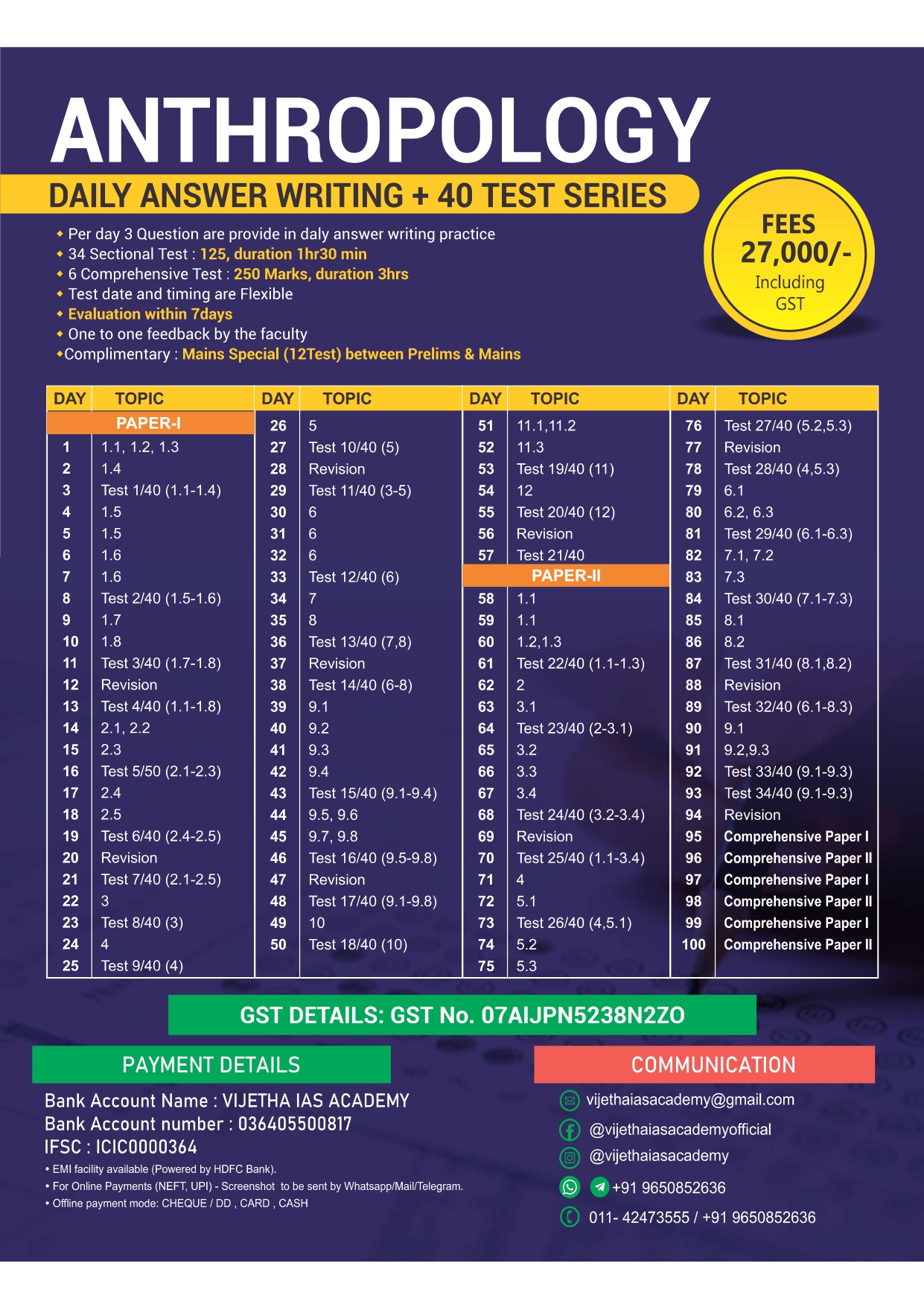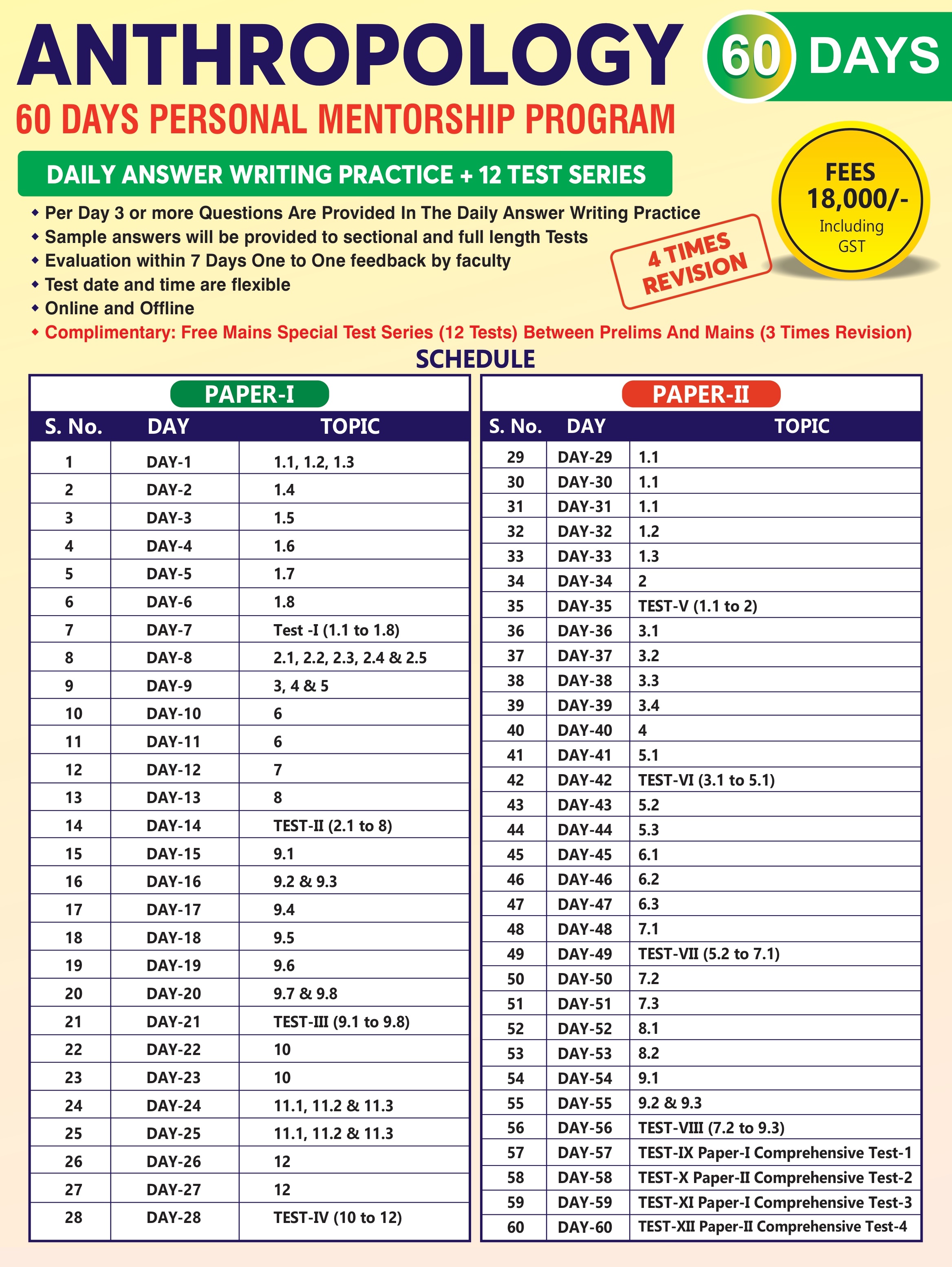
Discuss the applications of forensic anthropology with suitable examples.
(15 Marks) Anthropology Optional Paper CSE 2024
Introduction
Homo erectus is a crucial species in human evolution, believed to have emerged around 1.9 million years ago and surviving until approximately 110,000 years ago. It is the first hominin species to leave Africa, marking a significant evolutionary step in terms of mobility, adaptability, and cognitive abilities. Its geographical distribution spans Africa, Asia, and parts of Europe, highlighting its adaptability to diverse environments. This species represents a bridge between early hominins and later forms, contributing greatly to our understanding of human evolution.
Main Body
Geographical Distribution of Homo erectus:
Africa:
Homo erectus likely originated in Africa, with important fossil evidence from sites such as Koobi Fora in Kenya and Olduvai Gorge in Tanzania. Some African fossils are categorized as Homo ergaster, which is often considered an early form or regional variant of Homo erectus.
Asia:
Homo erectus expanded into Asia, with significant finds such as Java Man in Indonesia and Peking Man at Zhoukoudian in China. The Asian population is thought to have survived for a longer period than the African populations, persisting until around 110,000 years ago.
Europe:
Though less common, evidence of Homo erectus in Europe includes fossils from Dmanisi in Georgia, which provide insight into the early migration of hominins into Eurasia. These fossils represent some of the oldest evidence of hominin presence in Europe, dating to approximately 1.8 million years ago.
Physical Features of Homo erectus:
Cranial Characteristics:
Homo erectus had a relatively larger brain size, ranging from 600–1,100 cc, which was significantly larger than earlier species like Homo habilis but smaller than modern humans. The skull was characterized by a low forehead, prominent brow ridges, and a thick skull bone.
Post-cranial Anatomy:
Homo erectus had a robust body structure with modern limb proportions. This body structure was well-suited for long-distance walking and running, making it highly adaptive to diverse environments. Their height was similar to modern humans, typically between 5-6 feet tall, with a more muscular build.
Dentition:
The species exhibited smaller teeth compared to its predecessors, indicating a shift towards a more omnivorous diet, likely incorporating more cooked food. This development is closely tied to its use of fire, which played a role in dietary changes and social evolution.
Position in the Human Evolutionary Line:
Technological Advancements:
Homo erectus is known for its association with Acheulian tool technology, particularly the development of bifacial handaxes and cleavers. This technological leap reflects greater cognitive abilities, planning, and problem-solving skills compared to earlier hominins like Homo habilis.
Control of Fire:
Evidence suggests that Homo erectus was the first species to control fire, an innovation that had profound effects on diet, health, and social structures. Fire likely enabled cooking, leading to changes in nutrition, and may have facilitated longer periods of activity, allowing for better defense and cooperation.
Social Organization:
Homo erectus likely lived in small, cooperative groups, and exhibited early forms of social organization. Its ability to migrate over large distances and adapt to diverse environments suggests a level of cooperation and communication, laying the foundation for complex social behaviors in later hominins.
Evolutionary Placement:
Homo erectus is a pivotal species in the human evolutionary lineage. It serves as a direct ancestor to Homo heidelbergensis, which in turn led to both Homo neanderthalensis (Neanderthals) and Homo sapiens. The advancements in brain size, tool use, and social organization seen in Homo erectus are critical developments that mark its importance in the transition to modern humans.
Conclusion
Homo erectus holds a significant place in the human evolutionary line due to its wide geographical distribution, advanced physical and cognitive traits, and cultural innovations such as tool-making and fire control. Its ability to adapt to various environments across Africa, Asia, and Europe paved the way for the development of more complex hominin species, ultimately leading to modern Homo sapiens. Homo erectus thus represents a key evolutionary milestone in understanding the biological and cultural evolution of early humans.
Anthropology Test Series Programme (Online + Offline))
We provide Anthropology Daily Answer Writing a range of programs designed to cater to various stages of UPSC preparation. Whether you're just starting out, have attempted the Mains before, or are getting ready for Mains 2024, we have the right option for you. Allow us to assist you in choosing the course that best fits your needs.
|
Level of Preparation |
Test Series Program |
Test Series Content |
Test Schedule |
|
Self-study of Anthropology Optional |
Anthropology 100 Days Personal Mentorship Program |
Daily answer writing, 34 sectional tests, 6 comprehensive tests, and complementary Mains Special 12 tests (between prelims and mains) |
|
|
Revise whole syllabus through Daily Answer Writing Practice and Tests |
Anthropology DAW Mentorship Program |
Daily Answer Writing Practice and 8 sectional and 4 Full Length tests |
|
|
Revise whole syllabus through Sectional and Full Length Tests |
Anthropology Tier- I T-40 Test Series |
34 Sectionals and 6 Full Length Tests |
|
|
Written Mains earlier and need more practice |
16-Anthropology Tier II Test Series |
10 sectional and 6 Full-Length Tests. |
|
|
Cleared Prelims 2023 and are preparing for Mains 2023 |
Mains Special 12 Tests program |
8 Sectional and 4 Full-Length Tests |
ANTHROPOLOGY MAINS SPECIAL COURSES
Enroll in our Anthropology Mentorship Program today and take the first step towards achieving your UPSC goals!
1) If you are going for Self study of Anthropology Optional and looking for a Comprehensive Program that includes Daily Answer Writing, 34 Sectional tests, 6 Comprehensive tests, and Complementary mains special 12 tests (between prelims and mains), our Anthropology 100 Days Personal Mentorship Program is the perfect choice.
2) If you want to revise Whole Syllabus through Daily Answer Writing Practice and 8 sectional and 4 full-length tests, then our Anthropology DAW Mentorship Program is the best fit for you.
3) If you want to revise Whole Syllabus through 34 Sectionals and 6 Full Length Tests then Anthropology Tier- I T-40 Test Series is for you.
4) If you have written Mains earlier and need more practice, then our 16-Anthropology Tier II Test Series is a great option. This test series includes 10 sectional and 6 full-length tests.
5) if you have cleared Prelims 2023 and are preparing for Mains 2023,our Mains Special 12 Tests program is a must-have. This program includes 8 sectional and 4 full-length tests to help you prepare for the big day.
For more information on Vijetha IAS Academy’s Anthropology mentorship programs Deatils : https://vijethaiasacademy.com/anthropology-test-series
Anthropology 100 Days Personal Mentorship Program ( 7 + 3 Times Revision )

Anthropology 60 Days Personal Mentorship Program ( 4 + 3 Times Revision )

For more information: https://vijethaiasacademy.com/anthropology-test-series
Details Of Anthropology Classes Program
Top Anthropology Optional IAS Coaching Center in Delhi Vijetha IAS Academy | Best Anthropology Optional IAS Coaching in Delhi
Fee Structure:
- Tier 1: Rs. 55,150/- (3 Years Validity of Offline/Live Batch)
- Tier 2: Rs. 42,000/-
- Tier 3: Rs. 36,000/-
Batch Size: 50 – 60 Students
UPSC Notes
Anthropology Optional IAS Coaching Notes, IAS Exam Preparation Booklets, IAS optional coaching Notes, UPSC Coaching Notes, Video Lectures, Live Classes with faculty, Chat Facility Available
Teacher's Name: N P Kishore Sir
Past Result
- Last Years Result 2023
- 35 Total Selections in CSE 2023
Google Reviews: 4.9 out of 5 stars
Website: Vijetha Anthropology Optional IAS Coaching in Delhi (https://vijethaiasacademy.com)
Faculties of Vijetha IAS Academy
- N P Kishore Sir
Features
- Vijetha IAS Academy offers Online and offline Courses for better preparation of Anthropology Optional Strategy for UPSC in Delhi.
- For better Anthropology optional Exam Preparation, Vijetha IAS Academy Delhi Conducts the Motivational IAS Session.
- Vijetha IAS Academy provides you with the CASE STUDIES on the pattern of the real-time IAS Exam which is helpful for better preparation of the Best Coaching for UPSC Anthropology Optional Optional IAS Examination.
- DAW & WAW – Revision Through Daily & Weekly Answer Writing Practice is offered by Vijetha IAS Academy for better result of the Anthropology Optional IAS examination.
Advantages of joining Vijetha IAS Academy
- Best Faculties for Anthropology Optional IAS Coaching in Delhi
- Best facilities, infrastructure and updated Case Studies Booklets and Notes for better preparation of the Anthropology Optional IAS Examination in Delhi.
- Best result in Past years for Anthropology Optional Strategy for UPSC Examination in Delhi
- Best Rated coaching institute for Anthropology Optional IAS Examination in Delhi.
- Vijetha IAS Academy also provides recorded lectures videos, notes which is very helpful for better preparation of Anthropology Optional IAS Coaching in Delhi
Fees Structure of Vijetha IAS Academy
|
Tier 2 |
Tier 1 |
Tier 3 |
BATCH STARTS FROM |
|
42,000/- |
55,150/- (3 Years Validity Offline/Live Batch) |
36,000/- |
REGISTRATION – START |
Fees Structure of Vijetha IAS Academy
|
Course Name |
Fees Amount |
Course Duration |
|
GS Offline (Pre + Mains+ CSAT) with Essay+Answer Writing |
Rs.99,000 (Including GST) |
400+ Days |
|
GS Online |
Rs.18,999 (Including GST) |
400+ Days |
|
GS Mentorship Programme |
Rs.29,999 (Including GST) |
1 Year |
For more information on our courses, visit our Anthropology Courses page. Explore our Test Series and Online Courses for flexible learning options.
Vijetha IAS Academy
Add. 2nd Floor, 50, Shankar Road, Block 7, Old Rajinder Nagar, Rajinder Nagar, New Delhi, Delhi 110060
MOB. 096508 52636
Open 7 Am: Closes 9 PM
Keywords: Applications of Forensic Anthropology , anthropology 2024 question paper, Anthropology optional subject question paper 2024, Anthropology optionals 2024 question paper, Anthropology Optional Coaching UPSC, Vijetha IAS Academy Anthropology, Anthropology crash course UPSC, Anthropology daily answer writing UPSC, Kishore sir Anthropology, forensic anthropology applications, crime scene investigation, disaster victim identification, historical cases in forensic anthropology
